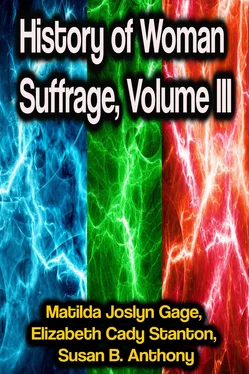The Rev. Olympia Brown, a delegate from Connecticut, addressed the committee as follows: Gentlemen of the Committee —I would not intrude upon your time and exhaust your patience by any further hearing upon this subject if it were not that men are continually saying to us that we do not want the ballot; that it is only a handful of women that have ever asked for it; and I think by our coming up from these different States, from Delaware, from Oregon, from Missouri, from Connecticut, from New Hampshire, and giving our testimony, we shall convince you that it is not a few merely, but that it is a general demand from the women in all the different States of the Union; and if we come here with stammering tongues, causing you to laugh by the very absurdity of the manner in which we advocate our opinions, it will only convince you that it is not a few "gifted" women, but the rank and file of the women of our country unaccustomed to such proceedings as these, who come here to tell you that we all desire the right of suffrage. Nor shall our mistakes and inability to advocate our cause in an effective manner be an argument against us, because it is not the province of voters to conduct meetings in Washington. It is rather their province to stay at home and quietly read the proceeding of members of congress, and if they find these proceedings correct, to vote to return them another year. So that our very mistakes shall argue for us and not against us.
In the ages past the right of citizenship meant the right to enjoy or possess or attain all those civil and political rights that are enjoyed by any other citizen. But here we have a class who can bear the burdens and punishments of citizens, but cannot enjoy their privileges and rights. But even the meanest may petition, and so we come with our thousands of petitions, asking you to protect us against the unjust discriminations imposed by State laws. Nor do we find that there is any conflict between the duties of the national government and the functions of the State. The United States government has to do with general interests, but everything that is special, has to do with sectional interests, belongs to the State. Said Charles Sumner:
The State exercises its proper functions when it makes local laws, promotes local charities, and by its local knowledge brings the guardianship of government to the homes of its citizens; but the State transcends its proper functions when in any manner it interferes with those equal rights recorded in the Declaration of Independence.
The State is local, the United States is universal. And, says Charles Sumner, "What can be more universal than the rights of man?" I would add, "What can be more universal than the rights of woman?" extending further than the rights of man, because woman is the heaven-appointed guardian of the home; because woman by her influence and in her office as an educator makes the character of man; because women are to be found wherever men are to be found, as their mothers bringing them into the world, watching them, teaching them, guiding them into manhood. Wherever there is a home, wherever there is a human interest, there is to be felt the interest of women, and so this cause is the most universal of any cause under the sun; and, therefore, it has a claim upon the general government. Therefore we come petitioning that you will protect us in our rights, by aiding us in the passage of the sixteenth amendment, which will make the constitution plain in our favor, or by such actions as will enable us to cast our ballots at the polls without being interfered with by State authorities. And we hope you will do this at no distant day. I hope you will not send my sister, the honorable lady from Delaware, to the boy, Jo, to ask him to define her position in the republic. I hope you will not bid any of these women at home to ask ignorant men whether they may be allowed to discharge their obligations as citizens in the matter of suffrage. I hope you will not put your wives and mothers in the power of men who have never given a half hour's consideration to the subject of government, and who are wholly unfit to exercise their judgment as to whether women should have the right of suffrage.
I will not insult your common sense by bringing up the old arguments as to whether we have the right to vote. I believe every man of you knows we have that right—that our right to vote is based upon the same authority as yours. I believe every man understands that, according to the declaration and the constitution, women should be allowed to exercise the right of suffrage, and therefore it is not necessary for me to do more than bear my testimony from the State of Connecticut, and tell you that the women from the rank and file, the law-abiding women, desire the ballot; not only that they desire it, but they mean to have it. And to accomplish this result I need not remind you that they will work year in and year out, that they will besiege members of congress everywhere, and that they will come here year after year asking you to protect them in their rights and to see that justice is done in the republic. Therefore, for your own peace, we hope you will not keep us waiting a long time. The fact that some States have made, temporarily, some good laws, does not weaken our demand upon you for the protection which the ballot gives to every citizen. Our interests are still uncared for, and we do not wish to be thus sent from pillar to post to get our rights. We wish to take our stand as citizens of the United States, as we have been declared to be by the Supreme Court, and we wish to be protected in the rights of citizenship. We hope the day is at hand when our prayers will be heard by you. Let us have at an early day in the Congressional Record , a report of the proceedings of this committee, and the action of the Senate in favor of woman's right to vote.
Brief remarks were also made by Mrs. Lawrence of Massachusetts, Mary A. Thompson, M. D., of Oregon, Mary Powers Filley of New Hampshire, Mrs. Blake of New York, Mrs. Hooker of Connecticut, and Sara Andrews Spencer of Washington.
At the close of these two day's hearings before the Committee on Privileges and Elections,[30] Senator Hoar of Massachusetts, offered, and the committee adopted the following complimentary resolution:
Resolved , That the arguments upon the very important questions discussed before the committee have been presented with propriety, dignity and ability, and that the committee will consider the same on Tuesday next, at 10 a.m.
The Washington Evening Star of January 11, 1876, said:
The woman suffrage question will be a great political issue some day. A movement in the direction of alleged rights by a body of American citizens cannot be forever checked, even though its progress may for many years be very gradual. Now that the advocates of suffrage for woman have become convinced that the thirteenth, fourteenth and fifteenth amendments are not sufficiently explicit to make woman's right to vote unquestioned, and that a sixteenth amendment is necessary to effect the practical exercise of the right, the millennial period that they look for is to all intents and purposes indefinitely postponed, for constitutional amendments are not passed in a day. But there are so many sound arguments to be advanced in favor of woman suffrage that it cannot fail in time to be weighed as a matter of policy, after it shall have been overwhelmingly conceded as a matter of right. And it is noticeable that the arguments of the opponents are coming more and more to be based on expediency, and hardly attempt to answer the claim that as American citizens women are entitled to the right. If the whole body of American women desired the practical exercise of this right, it is hard to see what valid opposition to their claims could be made. All this however does not amend the constitution. Woman suffrage must become a matter of policy for a political party before it can be realized. Congress does not pass revolutionary measures on abstract considerations of right. This question is of a nature to become a living political issue after it has been sufficiently ridiculed.
Читать дальше












